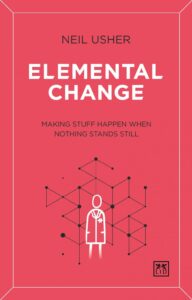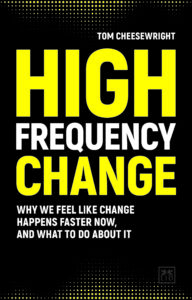|
How can you do your best at work during times of change?
By Guest Contributor Sid Madge, Transformation and Change Specialist and Founder of Meee
A much sought-after skill in the world of work is developing change capability. And over the last couple of years many of us have found our ability to adapt to change being challenged: many of us have been forced to change the way we work, the way we socialise, our holiday plans and the way we keep in touch with friends and family. No one knows what is around the corner so we may as well get comfortable with change!
I’m a great believer in instant change, little ‘micro-moments’ of learning or adaptation that allow us to actively take charge of our situation and emotions in the moment, to reset and to bring more of our best to help ourselves and others. Each micro-moment intervention is designed to be actionable in a minute and I’ve written three books on these micro-moments for life, work and family.
Here are some simple ways to cope with change and build resilience, and keep doing your job to the best of your ability.
Foster the Beginner’s Mind
Shoshin is the concept of the ‘beginner’s mind’ practiced in Zen Buddhism which refers to an attitude of openness, anticipation and lack of assumptions and preconceptions when learning a new subject – even when that learning is at an advanced level. When there is a change in your role focus on adopting the beginner’s mind. Perfection is not required: effort and openness are far more important.
Just ask
I don’t know about you but I’m not very good at asking for help and often get trapped in an inner world of introversion. Which can lead to feelings of doubt, insecurity and negative thinking. What can be really useful is just putting your hand up (metaphorically of course) and asking for help, or sharing your thoughts. Having employed a wonderful executive assistant called Paula I ask her advice on just about everything. And it really helps. I am sure you will have colleagues to talk to. And don’t forget to include your boss – after all they want you to succeed.
Just having someone to ask about things and share the load is so important, it’s well worth a try. And as the proverb says, ‘A problem shared is a problem halved’. And you will be able to reciprocate by helping others in turn.
Make good use of failure
Change requires us to do, think or be different in some way. This often means mistakes, failures and slip ups along the way. It’s rare that we move seamlessly from one position to the other without some stumbles. Learning to ride a bike is a change—a change from walking to a new form of transport—and learning to ride a bike doesn’t just happen miraculously. It’s a journey of anxiety, questionable balance and a few scrapes. Everyone fails their way to riding a bike.
We all know this and yet when we become adults, we dread failure. It is seen as a weakness or something that must be hidden or fudged. And that is rubbish! Failure is the only way to succeed at anything, including successful change. Take a minute to think about how many times you have embarked on change and created unrealistically high expectations for yourself. Stop expecting immediate perfection and instead settle for consistent effort.
Look after yourself
Work is an important part of our lives but it is not our entire life! To do our best at work and more widely in our lives we need to look after ourselves. This includes developing positive habits.
What do you love? What makes you happy? Is it meeting up with friends, listening to really loud music or singing at the top of your lungs in the car on the way to work? Do you love taking some time out and reading a good thriller? Maybe just enjoying some family time at the end of a challenging week.
Whatever it is – do more of it.
Make the most of positive habits
Change can be disconcerting. It can feel like your whole life is being shaken, so deliberately hang on to the positive habits that already make you feel happy and safe. If you don’t have any of those – make them. Take a minute to think back to a time in your life when you felt especially peaceful or happy – what exactly were you doing? Have you stopped doing that? If so, why?
Another great habit to get into is appreciation. In the shower in the morning or on your daily commute, take a few minutes to think about the three things that you are most grateful for in your life. Relish those things in the midst of change.
Take part in development opportunities wholeheartedly
During times of change you may well be asked to take part in a development activity where you look at your personal values and those of your organisation. See this as an opportunity for greater self-understanding not merely a requirement to participate.
When we feel our purpose and that of our employer are aligned, then we tap into higher levels of motivation and effort. When we can see the synergy of how our personal values align with the values of the company we work for, we feel more enthusiastic and connected and will know we are working at our best.
Take a few minutes to do the Meee Values exercise and consider how your current role allows you to live those values on a daily basis. If you discover that one of your values is kindness, where are you demonstrating kindness in your role, when does your organisation demonstrate kindness? Join the dots for greater personal alignment and connection to your work and company.
ABOUT THE AUTHOR

Sid Madge is a transformation and change specialist and founder of Meee. Meee draws on the best creativity and thinking from the worlds of branding, psychology, neuroscience, education and sociology, to help people embrace change and achieve extraordinary lives. Sid Madge is also author of the ‘Meee in Minute’ series of books which each offer 60 ways to change your life, work-, or family-life in 60 seconds.
Suggested Reading
 Elemental Change is a highly practical, human and humorous book that shows us how to make complex change attainable – organizational, professional or personal – whether you have years of experience or are facing your first major challenge. It helps us think about what change is and means, how we prepare for it and what we do to make it successful. It may just be the most readable book about change yet.
Elemental Change is a highly practical, human and humorous book that shows us how to make complex change attainable – organizational, professional or personal – whether you have years of experience or are facing your first major challenge. It helps us think about what change is and means, how we prepare for it and what we do to make it successful. It may just be the most readable book about change yet.
 Change is like a wave: it has both amplitude and frequency. The last century was about change of great amplitude, big waves washing over the whole society. But this century is about high frequency change: rapid, smaller waves, each powerful enough to disrupt an industry. High Frequency Change explains how we can understand high frequency change, what drives it, and how we must respond by changing the way we run our organisations – and our lives.
Change is like a wave: it has both amplitude and frequency. The last century was about change of great amplitude, big waves washing over the whole society. But this century is about high frequency change: rapid, smaller waves, each powerful enough to disrupt an industry. High Frequency Change explains how we can understand high frequency change, what drives it, and how we must respond by changing the way we run our organisations – and our lives.
